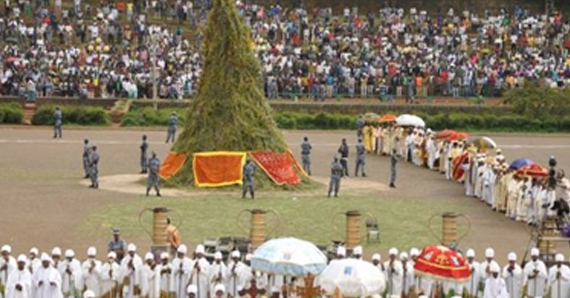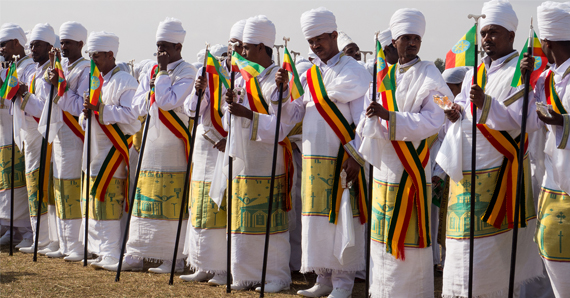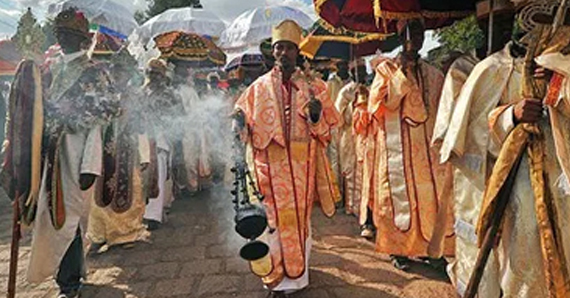




Meskel is celebrated by dancing, feasting and lighting a massive bonfire known in Ethiopian tradition as "Damera". Meskel commemorates the finding of the True Cross in the fourth century when Empress Helena, mother of Constantine the Great, discovered the True Cross on which Christ was crucified. The feast is celebrated in Ethiopia on September 17 Ethiopian calendar (September 27 Gregorian calendar), 6 months after the discovery of the True Cross. The celebration of Meskel signifies the presence of the True Cross at mountain of Gishen Mariam monastery and also symbolises the events carried out by Empress Helena.Meskel is celebrated by dancing, feasting and lighting a massive bonfire known in Ethiopian tradition as "Damera". Meskel commemorates the finding of the True Cross in the fourth century when Empress Helena, mother of Constantine the Great, discovered the True Cross on which Christ was crucified. The feast is celebrated in Ethiopia on September 17 Ethiopian calendar (September 27 Gregorian calendar), 6 months after the discovery of the True Cross. The celebration of Meskel signifies the presence of the True Cross at mountain of Gishen Mariam monastery and also symbolises the events carried out by Empress Helena. According to tradition, Empress Helena lit incense and prayed for assistance to guide her. The smoke drifted towards the direction of the buried cross. She dug and found three crosses; one of them was the True Cross used to crucify Jesus Christ. Empress Helena then gave a piece of the True Cross to all churches, including the Ethiopian Church. This piece was then brought to Ethiopia. According to the Ethiopian legend, when people get close to the piece of the True Cross it made them naked by its powerful light. Because of this, a decision was made to bury it at the mountain of Gishen Mariam monastery in Wollo region. The monastery of Gishen Mariam holds a volume of a book which records the story of the True Cross of Christ and how it was acquired.

Ledet (Christmas) falls on December 29 Ethiopian calendar (January 7 Gregorian calendar). Ledet (Christmas) is celebrated after 43 days fasting known as Tsome Gahad (Advent), with a spectacular procession, which begins at 6 AM and lasts until 9 AM. After the mass service, people go home to break the fast with the meat of chicken or lamb or beef accompanied with injera and the traditional drinks (i.e. tella or tej).

Timket (Epiphany) is one of the greatest festival in the Ethiopian Orthodox Tewahedo Church calendar. It commemorates Christ's Baptism by Saint John in the Jordan River. Timket is celebrated in Ethiopia on January 11 Ethiopian calendar (January 19 Gregorian calendar), two weeks after Ledet (Ethiopian Christmas), beginning on the Eve of Timket with colourful processions and ceremonies ending on the January 12 (January 20 Gregorian calendar). In Timket, Tella and Tej are brewed, special bread is baked called "Himbash" (in Tigrigna) "Ambasha" (in Amharic), and sheep are slaughtered to mark the three-day celebration.